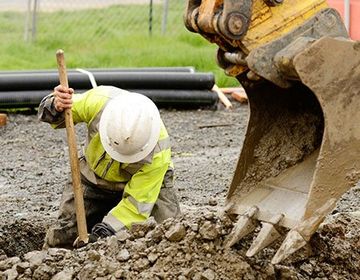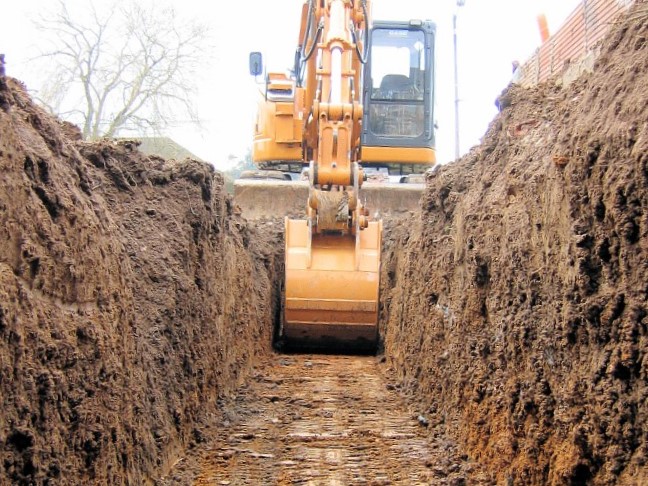Lancaster Excavation - Specialist Excavation Services in Lancaster, OH
Wiki Article
Comprehensive Excavation Strategies: Understanding the Basics for Success
The mindful planning, exact implementation, and precise interest to information called for in excavation tasks demand a detailed strategy that incorporates various essential elements. The real proficiency exists not merely in recognizing these basics however in seamlessly integrating them to navigate the intricacies of excavation tasks with skill.Understanding Excavation Project Preparation

Effective excavation jobs are improved the structure of careful and extensive preparation. The initial phase of any excavation project is the drawing board, where vital decisions are made that can substantially impact the end result of the job. During this stage, it is necessary to gather all pertinent information concerning the website, including topographical studies, soil structure, and any possible risks that might exist. Recognizing the task budget plan, timeline, and extent restraints is crucial for creating a thorough excavation plan that ensures the job's success.
One trick element of excavation task planning is the growth of a thorough timeline that details the sequence of target dates, turning points, and tasks. This timeline acts as a roadmap for the project group, enabling them to track progression and make essential modifications to ensure the task remains on timetable. Additionally, a well-defined budget plan that represents all expenditures, consisting of tools service, labor costs, and products, is crucial for staying clear of cost overruns and hold-ups. By carefully taking into consideration all these elements during the preparation stage, excavation jobs can be carried out efficiently and efficiently, causing successful results.
Soil Analysis and Website Analysis
Performing comprehensive dirt evaluation and website examination is an essential action in the preparation phase of any excavation job. Dirt evaluation includes determining the composition, structure, and residential or commercial properties of the dirt at the excavation website. This details is crucial for recognizing the soil's bearing ability, wetness material, and potential for erosion, which are essential consider identifying the excavation techniques and equipment needed for the job.Site evaluation exceeds soil analysis and incorporates a wider assessment of the general site problems. This analysis consists of identifying any type of prospective risks, such as underground utilities, ecological worries, or unpredictable surface, that could influence the excavation process. By thoroughly assessing the website, job supervisors can create effective excavation approaches that focus on security, performance, and environmental management.
Making use of sophisticated innovations like ground-penetrating radar, dirt tasting, and drone studies can enhance the accuracy and efficiency of dirt analysis and site evaluation. Investing time and resources in these initial actions can eventually conserve time and prevent expensive hold-ups or problems throughout the excavation process.
Devices Selection and Usage
Reliable excavation projects rely heavily on tactical tools choice and use to make sure optimum performance and performance. Choosing the appropriate tools for the job is crucial in taking full advantage of performance and reducing downtime. Factors such as the kind of dirt, depth of excavation, and task extent play a substantial function in determining the most suitable tools for the task handy.
In enhancement to choosing the appropriate equipment, appropriate application is key to project success. Operators must be trained to manage the equipment securely and successfully - lancaster excavation. Regular maintenance checks and timely repair services assist stop failures and ensure consistent efficiency throughout the job
Safety And Security Measures and Rules Compliance
In the realm of excavation jobs, focusing on security actions and conformity with regulations is paramount to guaranteeing a protected and legally sound operational setting. Precaution include a series of techniques, consisting of carrying out complete site analyses, applying proper signs and obstacles, and giving appropriate security training for all personnel entailed in the excavation procedure. Adherence to guidelines, such as OSHA demands in the USA, makes certain that the excavation job satisfies the needed criteria to shield employees, bystanders, and the surrounding environment.
try this site
Tracking Progression and Adjusting Techniques
Exactly how can forecast managers successfully track the innovation of excavation tasks and adapt their strategies accordingly to optimize end results? Monitoring progress is crucial for making certain that excavation tasks remain on track and satisfy target dates. Task managers can make use of different devices and methods to track development, such as daily progress records, regular website evaluations, and progressed tracking innovations like drones and GPS tracking systems. By continuously keeping track of the project's advancement, supervisors can recognize any kind of possible delays or issues early on and take aggressive measures to resolve them.
Verdict
To conclude, grasping the basics of thorough excavation methods is vital for the success of any kind of task. By understanding project preparation, examining soil and website problems, choosing ideal devices, adhering to security regulations, and keeping an eye on development, job supervisors can make certain a effective and smooth excavation procedure. Executing these methods will bring about effective results and lessen potential threats or problems during the excavation project.
The initial stage of any kind of excavation task is the planning phase, where essential choices are made that can substantially affect the outcome of the project. Comprehending the job extent, spending plan, and try this timeline restraints is critical for developing an extensive excavation strategy that makes certain the task's success.
Just how can predict supervisors effectively track the advancement of excavation tasks and adapt their approaches appropriately to maximize end results? By closely checking progress and being willing to adjust strategies, task supervisors can boost the overall success of excavation projects.
By recognizing job preparation, assessing dirt and website conditions, selecting ideal tools, abiding with security regulations, and checking progression, task managers can make certain a smooth and reliable excavation process.
Report this wiki page